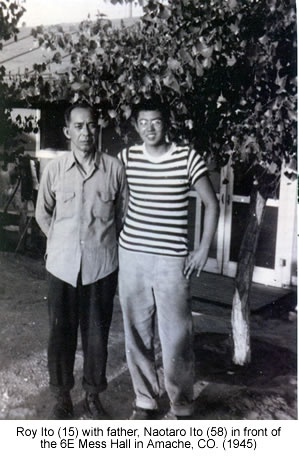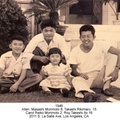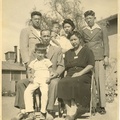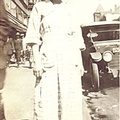I decided to go over to the Hikawa’s place on the other side of the block about 10:15 in the morning after school let out for the summer. I had been living in Amache since being “relocated” to southeastern Colorado from Santa Anita Assembly Center, California three years earlier.
A lot had changed in three years. As a 13 year old, everything was new and different. Having come from a white middle class neighborhood in West Central Los Angeles, I felt like an outsider when it came to Nisei (Japanese American) kids who grew up together in the same neighborhood in a different area of Los Angeles. As far as I could tell, the large number of kids stuck closely together and had their own way about them. Then there were kids from Northern California from such places like Merced, Turlock, Marysville and Santa Rosa who were brought up on farms. The kids from Los Angeles regarded the kids from the farming communities as country bumpkins and treated them as low life.
During the first week of school, one of the older Los Angeles kids singled me out seeming without provocation and shoved me around saying “You think you’re good, eh?” and tried to get me to fight. This was when the whole student body of the junior high school was out collecting scrap lumber for fire wood so I felt the whole world had witnessed my total humiliation because I was so confused and intimidated that I stammered something like “N n n no. I don’t want to fight,” and did not try to defend myself. I later learned that the provocation was that I had an encounter with a classmate who was a younger cousin of the guy who intimidated me. Apparently, the classmate told his older cousin about the dispute and about me.
I had a lot of learning to do about how to get along in the Nisei subculture. I was bewildered and devastated by the incident for months but as a result I resolved that I would not allow myself to be in that predicament again and somehow I would even the score with the classmate who tattled on me to his cousin. The opportunity came up several months later when a Nisei boxer taught a boxing class for kids in the junior high school. I maneuvered myself to be the boxing sparring partner of the classmate in question. Since I was a better boxer than the classmate, I beat him up every class day until he finally quit the class. In the meantime, I was getting to know several of the Los Angeles kids known as the Seinans.
I learned that to become accepted by the group, you avoided appearing ambitious or trying too hard at anything except athletics because that would set you apart from the group. “Cool” was what everyone was supposed to be and it was considered uncool to draw attention to yourself. One tried to be the same as everyone else but if he were to accomplish something great it was okay as long as he not appear to be trying too hard.
The Hikawa brothers had originally come from Sacramento that interestingly enough produced a subculture very similar to the Los Angeles group because the Hikawas were almost immediately accepted by the Seinans. There were three brothers. Charles or “Baldy” was the oldest and he was 18 at the time. Baldy having a “pachuco” or ducktail type hair style was considered a “yogore” (dirty, no count shady character) by the adult Issei. Frank and George were identical twins. George seemed to be the brighter of the two but Frank was more personable and a better athlete.
I got to know George first because Frank was in the hospital when the Hikawas first moved to Amache from Tule Lake (another relocation camp). When Frank was released from the hospital after recovering from an appendectomy, he was very friendly to me. George then became less friendly. This was the first time I experienced sibling rivalry that caused me to be caught in the middle of the two brothers. When I appeared to get close to one, the other became distant. However, if I alienated one, they would both turn against me. Therefore, I really had to be careful in my dealings with the twins and Baldy. The matter of family loyalty was very evident in the family.
At one time, I must have done something that George didn’t like because I began to see derogatory comments about me on the walls of the community john and got the cold shoulder treatment from all the guys in the block. The reason I knew it was George was because the comments were in his handwriting and he was capable of turning the others against me. This went on for several months and then for some reason George and Frank befriended me again. I still don’t know what to this day had provoked George in the first place.
It was early May 1945 when I went over to the Hikawas’ and spoke to Frank about going to Chicago since I had heard that they were going as soon as school let out in June. Baldy was already there since he had been forced to leave camp when the group of us from the block had been caught breaking classroom windows one night as we were coming home from a movie across camp. In the hearing regarding the incident, Baldy was made primarily responsible for the wrongdoing and forced to leave camp or face criminal prosecution. The rest of us were suspended from school for what turned out to be a week. My mother was terribly upset with me and was convinced that I was now a yogore, bringing shame on our family.
The Hikawa family was going to relocate in Chicago. The father had been there for two years and had recently found a place to rent where the mother could run a boarding house. Frank invited me to stay at his mother’s boarding house that summer. My father had agreed to letting me go to Chicago that summer but arranged for me to live at the home of the Takada family who were long time friends of our family. This must have been a very difficult decision for him to make but he decided that the experience of being on my own would be good for me.
The day of our departure was a bright sunny day in June. Many people were at the Granada train station to see us off. In the distance was a girl I had a serious crush on the previous year who apparently came to see one of her friends off. In addition to the Hikawa brothers, the Kagawa family from our block was on the train along with many people I didn’t recognize. One of their daughters, Masayo, had been a classmate of mine. Masayo said that her family was going to Seabrook, New Jersey to join other families in a farming venture. As the train departed, I felt a sense of joy and adventure.
After we had traveled an hour, the tall silos of the Kansas wheat fields came into view and miles and miles of flat farmlands. The train stopped often to take on or let off passengers at such places as Garden City and Pittsburg, Kansas. We stopped for at least an hour in Kansas City, Missouri and we got off briefly to stretch our legs. We arrived in Chicago the next day at the old La Salle Station. I said goodbye to Masayo Kagawa and wished her well in her new life in Seabrook thinking that perhaps I would never see her again.
We took the cab first to the Hikawa’s boardinghouse on La Salle Avenue and then I went on to the Takada’s duplex apartment that was a few miles further on the north side of Chicago. There I was greeted by Mrs. Takada, a very soft spoken gracious lady.
The next few days were spent getting acquainted with Chicago. I walked in the neighborhood, rode the elevated train to the Loop in Chicago that was the central part of the city and found myself lost on numerous occasions. The sounds and smells of Chicago were exciting in part because descriptions of the city by the older guys who had been there and returned to camp. Everything was new and fresh to me and I wanted to experience it all.
© 2008 Roy T. Ito






